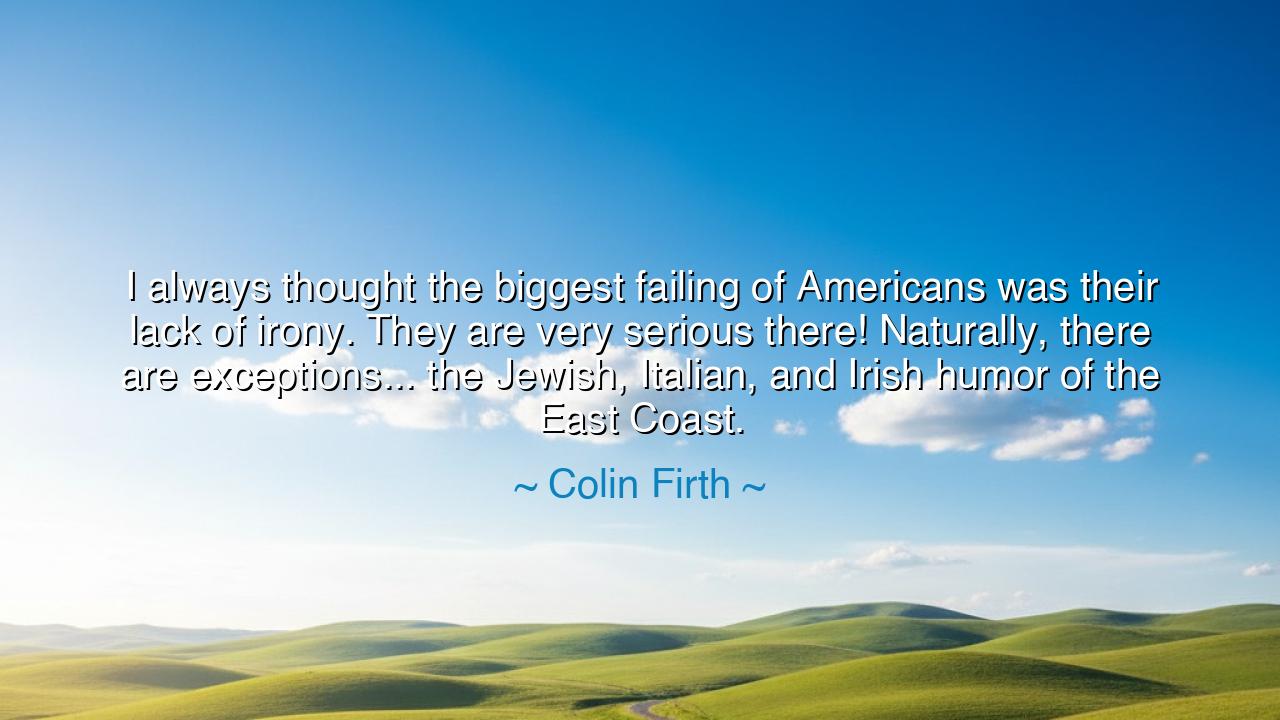
I always thought the biggest failing of Americans was their lack
I always thought the biggest failing of Americans was their lack of irony. They are very serious there! Naturally, there are exceptions... the Jewish, Italian, and Irish humor of the East Coast.






In the discerning and gently provocative words of Colin Firth, we find not a simple jest, but a reflection on culture, perception, and the soul of humor itself: “I always thought the biggest failing of Americans was their lack of irony. They are very serious there! Naturally, there are exceptions... the Jewish, Italian, and Irish humor of the East Coast.” Beneath his wit lies an ancient truth — that irony is not mere sarcasm or cleverness, but a mark of wisdom, the quiet art of seeing both the light and the shadow of existence at once. Firth’s words are not a criticism of a nation, but an observation of temperament — the difference between those who confront life with solemn earnestness and those who disarm its heaviness with laughter and paradox.
The origin of this quote is rooted in Firth’s own experience as an Englishman, shaped by a culture where irony is as natural as breath. British humor, born in centuries of hardship and restraint, thrives on understatement, self-mockery, and the subtle turning of tragedy into amusement. To the English, irony is not cruelty; it is survival — a way of confronting the absurdity of the world without surrendering to despair. Yet in his travels, Firth found that in America, the spirit was often more direct, more hopeful, more earnest. Where the European smiles knowingly at the folly of man, the American seeks to correct it. Where the Briton shrugs at contradiction, the American wrestles it to the ground. Thus his words capture the meeting of two great energies — one of irony, one of sincerity — each with its strength, each with its weakness.
To understand the depth of his reflection, we must recall what irony truly is. It is the wisdom of opposites — the ability to laugh at life’s contradictions while still loving it fiercely. The ancients knew this well. Socrates, whose humor was as sharp as his mind, used irony as a tool of truth. When he claimed to “know nothing,” he was both mocking and revealing — teaching through humility that true wisdom begins in awareness of ignorance. Irony, then, is not cynicism; it is the balance between knowledge and acceptance, the laughter of the wise who see life’s futility and still find it beautiful.
Firth’s mention of Jewish, Italian, and Irish humor pays homage to cultures that have long turned suffering into laughter. The Jewish tradition, forged in exile and endurance, gave the world a humor that mingles sorrow with grace — a humor that says, “If we cannot laugh at the absurdity of our pain, it will consume us.” The Irish, shaped by tragedy and longing, sing and joke with equal fervor, transforming melancholy into mirth. And the Italians, with their passion and theatricality, embrace the comedy of life’s chaos, laughing as they live, loving as they lose. These traditions share the same essence: the recognition that humor is not an escape from truth, but a deeper encounter with it.
Consider, for a moment, the example of Winston Churchill, that great statesman whose humor often saved not just his own spirit, but his nation’s. When told that Britain stood alone against overwhelming odds in the Second World War, he replied, “Very well, we shall fight them with sandwiches and broomsticks if we must.” In that laughter lay courage. Irony gave him the power to defy despair. It is this same kind of humor Firth admires — one that arises not from indifference, but from depth of understanding. For irony, when wielded with grace, turns fear into defiance, and pain into wisdom.
And yet, Firth’s observation also carries a warning. When seriousness rules the heart untempered by irony, even noble intentions may harden into self-righteousness. A nation or a soul without irony risks losing its flexibility, mistaking conviction for perfection. But the opposite is equally perilous: irony without compassion becomes cruelty, a cold detachment from life’s warmth. Thus, the true path — the ancient path — lies in balance: to care deeply, but never take oneself too seriously; to work for truth, but smile at the absurdity of the journey.
So, my child of tomorrow, take this lesson as both mirror and guide. Cultivate irony, but let it be the irony of kindness. Learn to laugh at yourself, at your own illusions, at the stubborn earnestness of your desires. When life feels too heavy, let humor be your lightness; when the world grows too loud with certainty, let irony remind you of mystery. Remember that laughter, especially at your own expense, is not weakness but wisdom. It is the mark of a heart that has seen the foolishness of life and chosen, still, to love it.
In this way, you will embody the spirit of Firth’s words — the harmony of seriousness and humor, of intellect and humility. For to live with irony is to live awake: to see the folly, to feel the beauty, and to embrace both with a smile that says, “Yes, the world is ridiculous — and yet, it is mine to cherish.”






AAdministratorAdministrator
Welcome, honored guests. Please leave a comment, we will respond soon